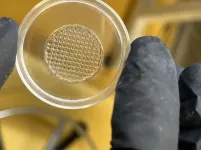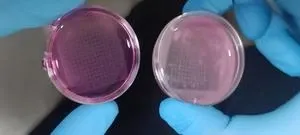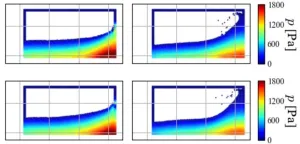(Press-News.org) Directive 2010/63/EU laid down restrictions on animal testing for the testing of cosmetics and their ingredients throughout the EU. Therefore, there is an intense search for alternatives to test the absorption and toxicity of nanoparticles from cosmetics such as sun creams. A team of researchers from Graz University of Technology (TU Graz) and the Vellore Institute of Technology (VIT) in India is working on the development of skin imitations that mimic the native three-layer tissue structure and biomechanics of human skin. Such imitations can be produced using 3D printing and consist of hydrogel formulations that are printed together with living cells.
Hydrogels in which skin cells survive and grow
“The hydrogels for our skin imitation from the 3D printer have to fulfil a number of requirements,” says Karin Stana Kleinschek from the Institute of Chemistry and Technology of Biobased Systems. “The hydrogels must be able to interact with living skin cells. These cells not only have to survive, but also have to be able to grow and multiply.” The starting point for stable and 3D-printable structures are hydrogel formulations developed at TU Graz. Hydrogels are characterised by their high-water content, which creates ideal conditions for the integration and growth of cells. However, the high-water content also requires methods for mechanical and chemical stabilisation of the 3D prints.
TU Graz is working intensively on cross-linking methods for stabilisation. Ideally, following nature’s example, the cross-linking takes place under very mild conditions and without the use of cytotoxic chemicals. After successful stabilisation, the cooperation partners in India test the resistance and toxicity of the 3D prints in cell culture. Only when skin cells in the hydrogel survive in cell culture for two to three weeks and develop skin tissue can we speak of a skin imitation. This skin imitation can then be used for further cell tests on cosmetics.
Successful tests
The first tests of 3D-printed hydrogels in cell culture were very successful. The cross-linked materials are non-cytotoxic and mechanically stable. “In the next step, the 3D-printed models (skin imitations) will be used to test nanoparticles,” says Karin Stana Kleinschek. “This is a success for the complementary research at TU Graz and VIT. Our many years of expertise in the field of material research for tissue imitations and VIT’s expertise in molecular and cell biology have complemented each other perfectly. We are now working together to further optimise the hydrogel formulations and validate their usefulness as a substitute for animal experiments.”
END
Printed skin to replace animal testing
A research team from TU Graz and the Vellore Institute of Technology in India is developing a 3D-printed skin imitation equipped with living cells in order to test nanoparticles from cosmetics without animal testing.
2025-04-03
ELSE PRESS RELEASES FROM THIS DATE:
Precision medicine could be possible in the fight against antibiotic resistance
2025-04-03
The first-of-its-kind in-depth bacterial evolutionary map could pave the way for the development of precision treatments for certain antibiotic-resistant infections, such as urinary tract infections.
Researchers at the Wellcome Sanger Institute, the University of Oslo, UiT The Arctic University of Norway, and their collaborators, have developed a new way of using large-scale long-read sequencing data to investigate circular genetic structures called plasmids in the most commonly studied microbe, Escherichia coli (E. coli). Through this, the team were able to track the flow ...
Researchers at the Lewis Katz School of Medicine at Temple University identify new targeted approach to protect neurons against degeneration
2025-04-03
(Philadelphia, PA) – Neurodegenerative conditions such as Parkinson’s disease and Alzheimer’s involve progressive neuronal loss due to disease-induced damage. An enzyme known as dual leucine-zipper kinase (DLK) plays a key role in this process, telling neurons that are damaged or unhealthy when they should cut their losses and self-destruct. Hence, sparing neurons from DLK is an attractive therapeutic strategy that could slow disease progression.
Past attempts to inhibit DLK’s action in human patients, however, led to unexpected side effects affecting the nervous system, suggesting that DLK ...
Western diet causes inflammation, traditional African food protects
2025-04-03
A switch of just two weeks from a traditional African diet to a Western diet causes inflammation, reduces the immune response to pathogens, and activates processes associated with lifestyle diseases. Conversely, an African diet rich in vegetables, fiber, and fermented foods has positive effects. This study, published in Nature Medicine, highlights the significant impact of diet on the immune system and metabolism.
Lifestyle diseases such as cardiovascular diseases, diabetes, and chronic inflammatory conditions are surging across Africa, posing a growing challenge to healthcare systems throughout the continent. Increasing economic ...
Electrochemical method supports nitrogen circular economy
2025-04-03
By Shawn Ballard
Imagine a world where industrial waste isn’t just reduced, it’s turned into something useful. This kind of circular economy is already in the works for carbon. Now, researchers in energy, environmental & chemical engineering at Washington University in St. Louis have developed a promising pathway to convert harmful nitric oxide, a key component of acid rain, into valuable nitric acid, which is used in everyday applications from fertilizer production to metal processing.
Feng Jiao, the Lauren and Lee Fixel Distinguished Professor in the McKelvey School of Engineering at WashU, and collaborators developed a method ...
How researchers are shining a light on kidney disease
2025-04-03
For patients with polycystic kidney disease (PKD), a common genetic disorder that ravages the waste-removing organ with cysts, dialysis and transplantation are among the only treatments.
More than 12.4 million people worldwide suffer from the dominant form of the condition. Now, Rutgers University geneticists have uncovered fresh details of how the disease progresses – findings that could open the door to new therapies.
In a study published in Nature Communications, Inna Nikonorova, a research assistant professor in the Department of Genetics within the Rutgers School of Arts and Sciences, reports on a novel way to identify and track material carried ...
Some gut bacteria could make certain drugs less effective
2025-04-03
A new study, published today in Nature Chemistry by researchers from the University of Pittsburgh and Yale University, shows how common gut bacteria can metabolize certain oral medications that target cellular receptors called GPCRs, potentially rendering these important drugs less effective.
Drugs that act on GPCRs, or G protein-coupled receptors, include more than 400 medications approved by the U.S. Food and Drug Administration (FDA) for treatment of many common conditions such as migraines, depression, type 2 diabetes, prostate cancer and more.
“Understanding how GPCR-targeted drugs interact with human gut microbiota is critical for advancing ...
PEPITEM sequence shows effects in psoriasis, comparable to steroid cream
2025-04-03
Birmingham scientists have shown that a sequence of just three amino acids may reduce the severity of psoriasis, when applied topically in an emollient cream.
The researchers, whose study is published in Pharmacological Research, identified the smallest part of a peptide (small protein) called PEPITEM, which occurs naturally in the body and regulates inflammation.
The study also showed that both PEPITEM and the three amino acid (tripeptide) sequence delivered a significant reduction in the severity of psoriasis, that is comparable to a steroid cream.
Psoriasis ...
Older teens who start vaping post-high school risk rapid progress to frequent use
2025-04-03
A new study has found that young vapers in the United States who begin using e-cigarettes after graduating from secondary/high school are likely to progress rapidly to frequent use. While US youths who start vaping during secondary/high school typically take about three years to progress to frequent use, this newly identified group of young adults who start vaping a bit later, after graduation (mean age = 20 years), tend to reach frequent use in about one year. ‘Frequent use’ is defined as using e-cigarettes on 20 or ...
Corpse flowers are threatened by spotty recordkeeping
2025-04-03
Commonly called the “corpse flower,” Amorphophallus titanum is endangered for many reasons, including habitat destruction, climate change and encroachment from invasive species.
Now, plant biologists from Northwestern University and the Chicago Botanic Garden have added a new threat to the list: incomplete historical records.
In a new study, scientists constructed the ancestry of corpse flowers living in collections at institutions and gardens around the world. They found a severe lack of consistent, standardized data. Without complete historical records, conservationists were unable to make informed decisions ...
Riding the AI wave toward rapid, precise ocean simulations
2025-04-03
AI has created a sea change in society; now, it is setting its sights on the sea itself.
Researchers at Osaka Metropolitan University have developed a machine learning-powered fluid simulation model that significantly reduces computation time without compromising accuracy. Their fast and precise technique opens up potential applications in offshore power generation, ship design and real-time ocean monitoring.
Accurately predicting fluid behavior is crucial for industries relying on wave and tidal energy, as well as for design of maritime structures and vessels. ...
LAST 30 PRESS RELEASES:
Spiritual practices strongly associated with reduced risk for hazardous alcohol and drug use
Novel vaccine protects against C. diff disease and recurrence
An “electrical” circadian clock balances growth between shoots and roots
Largest study of rare skin cancer in Mexican patients shows its more complex than previously thought
Colonists dredged away Sydney’s natural oyster reefs. Now science knows how best to restore them.
Joint and independent associations of gestational diabetes and depression with childhood obesity
Spirituality and harmful or hazardous alcohol and other drug use
New plastic material could solve energy storage challenge, researchers report
Mapping protein production in brain cells yields new insights for brain disease
Exposing a hidden anchor for HIV replication
Can Europe be climate-neutral by 2050? New monitor tracks the pace of the energy transition
Major heart attack study reveals ‘survival paradox’: Frail men at higher risk of death than women despite better treatment
Medicare patients get different stroke care depending on plan, analysis reveals
Polyploidy-induced senescence may drive aging, tissue repair, and cancer risk
Study shows that treating patients with lifestyle medicine may help reduce clinician burnout
Experimental and numerical framework for acoustic streaming prediction in mid-air phased arrays
Ancestral motif enables broad DNA binding by NIN, a master regulator of rhizobial symbiosis
Macrophage immune cells need constant reminders to retain memories of prior infections
Ultra-endurance running may accelerate aging and breakdown of red blood cells
Ancient mind-body practice proven to lower blood pressure in clinical trial
SwRI to create advanced Product Lifecycle Management system for the Air Force
Natural selection operates on multiple levels, comprehensive review of scientific studies shows
Developing a national research program on liquid metals for fusion
AI-powered ECG could help guide lifelong heart monitoring for patients with repaired tetralogy of fallot
Global shark bites return to average in 2025, with a smaller proportion in the United States
Millions are unaware of heart risks that don’t start in the heart
What freezing plants in blocks of ice can tell us about the future of Svalbard’s plant communities
A new vascularized tissueoid-on-a-chip model for liver regeneration and transplant rejection
Augmented reality menus may help restaurants attract more customers, improve brand perceptions
Power grids to epidemics: study shows small patterns trigger systemic failures
[Press-News.org] Printed skin to replace animal testingA research team from TU Graz and the Vellore Institute of Technology in India is developing a 3D-printed skin imitation equipped with living cells in order to test nanoparticles from cosmetics without animal testing.




